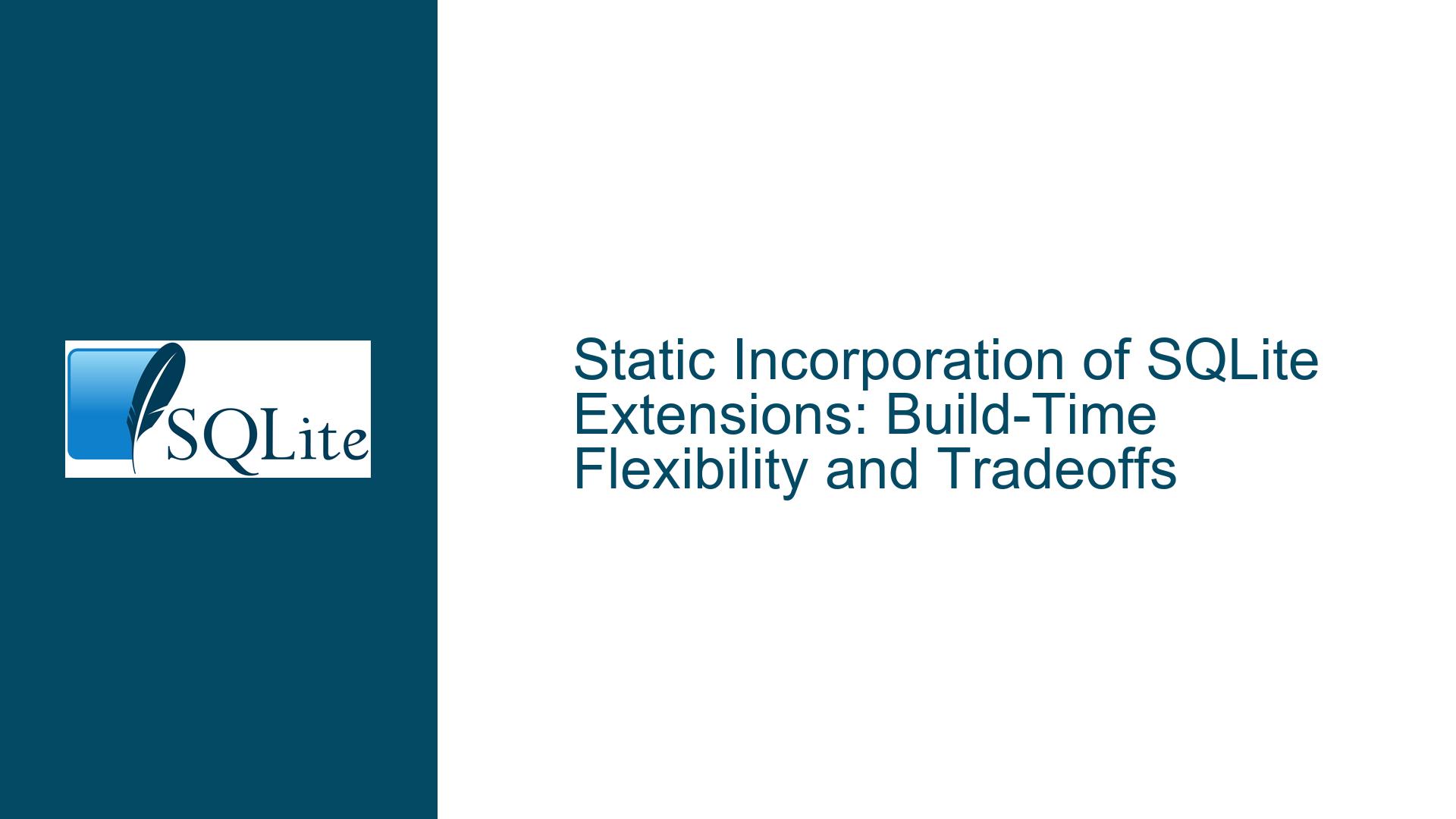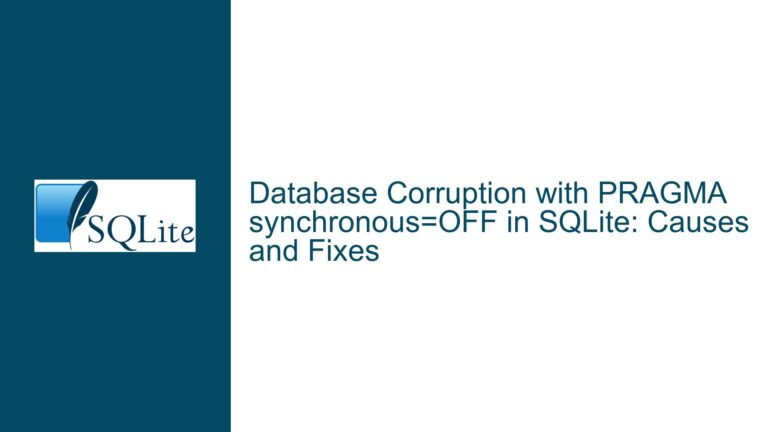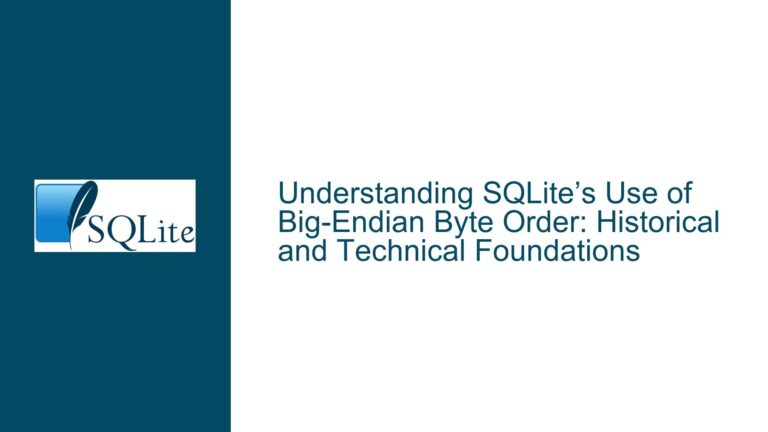Static Incorporation of SQLite Extensions: Build-Time Flexibility and Tradeoffs
Issue Overview: Static Incorporation of Extensions in SQLite Builds
The core issue revolves around the static incorporation of extensions into SQLite builds, particularly in the SQLite CLI (Command Line Interface) and the core library. The problem arises from the current practice of embedding certain extensions directly into the CLI or library during the build process, which limits flexibility for developers who may not need or want all the included extensions. This static inclusion can lead to unnecessary bloat in the binary size, especially for users who require a minimalistic build for resource-constrained environments such as embedded systems or mobile devices.
The discussion highlights the tension between providing a feature-rich SQLite experience out-of-the-box and maintaining the ability to customize builds for specific needs. The SQLite team has traditionally prioritized keeping the core library small, which has led to many generally useful functions being built into the CLI rather than the core library. While this approach benefits users who rely on pre-built binaries, it creates challenges for developers who need to integrate these extensions into their own applications without modifying the SQLite source code.
The issue is further complicated by the fact that some extensions are only relevant to the CLI, while others have broader utility and could be beneficial in the core library. Additionally, the current build process does not provide an easy way for developers to exclude certain extensions at build time without editing the distributed source files. This lack of flexibility can be a significant pain point for developers who need to optimize their builds for specific use cases.
Possible Causes: Why Static Incorporation of Extensions is Problematic
The primary cause of this issue lies in the historical design choices made by the SQLite team to prioritize a small core library size. This design philosophy has led to the inclusion of many useful but non-essential functions as extensions within the CLI rather than the core library. While this approach keeps the core library lightweight, it inadvertently shifts the burden of managing these extensions to the CLI, which is not always the ideal place for them.
One of the key challenges is that the CLI is often used as a testing and debugging tool, and many developers rely on it for quick access to SQLite functionality. However, when extensions are statically built into the CLI, they become inaccessible to developers who want to use them in their own applications without also incorporating the CLI. This creates a disconnect between the functionality available in the CLI and what is available in the core library, leading to frustration for developers who need to replicate CLI functionality in their own code.
Another contributing factor is the lack of a standardized mechanism for selectively including or excluding extensions at build time. Currently, developers who want to customize their builds must manually edit the source files or use preprocessor directives, which can be error-prone and time-consuming. This lack of flexibility is particularly problematic for developers working on resource-constrained platforms, where every kilobyte of binary size matters.
Furthermore, the current approach to static incorporation of extensions does not account for the varying needs of different platforms. For example, a desktop application running on a modern laptop may have no issue with a larger binary size, while an embedded system with limited memory and storage may require a much smaller footprint. The one-size-fits-all approach to static incorporation of extensions does not adequately address these divergent requirements.
Troubleshooting Steps, Solutions & Fixes: Enhancing Build-Time Flexibility for SQLite Extensions
To address the issues surrounding the static incorporation of extensions, several potential solutions and fixes can be considered. These solutions aim to provide greater flexibility for developers while maintaining the benefits of a feature-rich SQLite experience.
1. Introduce Build-Time Flags for Selective Extension Inclusion
One of the most straightforward solutions is to introduce build-time flags that allow developers to selectively include or exclude extensions during the build process. These flags could be implemented as preprocessor definitions that control the inclusion of specific extensions in both the CLI and the core library. For example, a flag like SQLITE_ENABLE_EXTENSION_JSON1 could be used to include or exclude the JSON1 extension from the build.
This approach would allow developers to easily customize their builds without needing to modify the source files directly. It would also provide a clear and standardized way to manage extensions, reducing the risk of errors and making the build process more predictable. Additionally, this solution could be extended to support platform-specific builds, where different sets of extensions are included based on the target platform.
2. Create Separate Amalgamations for Core and Extensions
Another potential solution is to create separate amalgamations for the core library and the extensions. The core amalgamation would contain only the essential SQLite functionality, while the extensions amalgamation would include all the optional extensions. Developers could then choose to include the extensions amalgamation in their builds if they need the additional functionality.
This approach would provide a clear separation between the core library and the extensions, making it easier for developers to manage their builds. It would also allow for more granular control over which extensions are included, as developers could selectively include only the extensions they need. Additionally, this solution would make it easier to distribute pre-built binaries with different levels of functionality, as the core and extensions could be distributed separately.
3. Implement a Dynamic Extension Loading Mechanism
A more advanced solution would be to implement a dynamic extension loading mechanism that allows extensions to be loaded at runtime rather than being statically incorporated into the build. This mechanism could be similar to the existing sqlite3_load_extension function but would provide a more streamlined way to load multiple extensions at once.
With this approach, developers could build a minimal SQLite binary and then load the extensions they need at runtime. This would provide maximum flexibility and allow developers to optimize their builds for specific use cases. It would also make it easier to update or replace extensions without needing to rebuild the entire SQLite binary.
4. Provide Pre-Built Extension Packages
To further simplify the process of managing extensions, the SQLite team could provide pre-built extension packages that developers can easily integrate into their projects. These packages could be distributed as dynamic libraries (e.g., DLLs or shared objects) that can be loaded at runtime, or as source code that can be included in custom builds.
This solution would be particularly beneficial for developers who do not want to deal with the complexities of building SQLite from source. It would also make it easier to distribute updates to extensions, as developers could simply replace the pre-built packages without needing to modify their build process.
5. Enhance Documentation and Tooling for Extension Management
Finally, improving the documentation and tooling around extension management could go a long way toward addressing the issues raised in the discussion. Clear and comprehensive documentation on how to include or exclude extensions at build time, as well as how to load them dynamically, would help developers better understand their options and make informed decisions.
Additionally, providing tools or scripts to automate the process of managing extensions could further reduce the burden on developers. For example, a script that generates a custom SQLite build based on a configuration file specifying which extensions to include could save developers significant time and effort.
Conclusion
The static incorporation of extensions in SQLite builds presents a complex challenge that requires a careful balance between providing a feature-rich experience and maintaining build-time flexibility. By introducing build-time flags, creating separate amalgamations, implementing dynamic extension loading, providing pre-built extension packages, and enhancing documentation and tooling, the SQLite team can address these challenges and provide developers with the flexibility they need to optimize their builds for specific use cases. These solutions would not only improve the developer experience but also ensure that SQLite remains a versatile and powerful tool for a wide range of applications.





